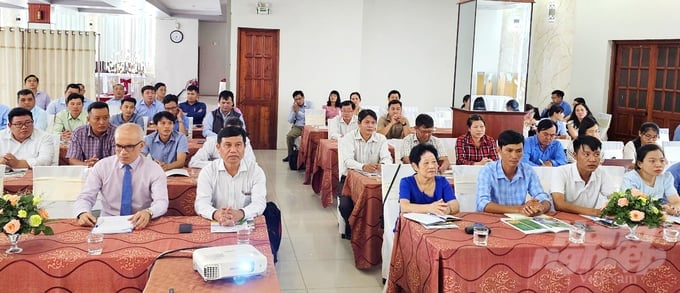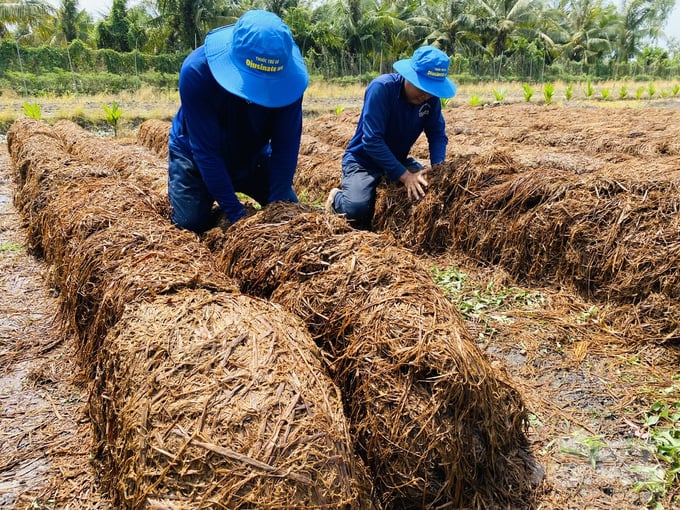May 18, 2025 | 21:17 GMT +7
May 18, 2025 | 21:17 GMT +7
Hotline: 0913.378.918
May 18, 2025 | 21:17 GMT +7
Hotline: 0913.378.918

From July 10 to July 12, the Ministry of Agriculture and Rural Development, in collaboration with the Science Institute of Rural Development (SIRD), organized a training course on circular economy in the rice value chain in An Giang province. Photo: Le Hoang Vu.
From July 10 to July 12, grassroots agricultural extension officers from six provinces in the Mekong Delta received lectures from domestic and international experts on the suitability of circular economy principles within the "Sustainable Development Project for one million hectares of specialized, low-emission high-quality rice in association with green growth in the Mekong Delta region by 2030." Additionally, participants of the training course explored circular economy as a concept; utilization of by-products; and sustainable rice straw management for multiple purposes such as mushroom cultivation and organic fertilizer production.
Additionally, participants visited mushroom farms and organic fertilizer cooperatives; engaged in group discussions on developing circular business models and formulate plans to utilize circular economy models.
The training course aims to raise awareness among actors within the rice value chain regarding the role of circular economy, provide technical guidance, and offer practical knowledge on the implementation of circular economy models in rice production. It also aims to foster public-private partnership and mobilize investments from governmental and private entities into adopting circular economy models within agricultural value chains.

Grassroots agricultural extension officers from six provinces in the Mekong Delta have received advanced training in managing and mechanizing rice straw processing stages. Photo: Le Hoang Vu.
According to Ton That Thinh, Deputy Director of An Giang province's Department of Agriculture and Rural Development, the training course on circular economy principles within the rice value chain facilitate the implementation of the "Sustainable Development Project for one million hectares of specialized, low-emission high-quality rice in association with green growth in the Mekong Delta region by 2030."
Participants have the opportunity to enhance their capacities in managing and mechanizing rice straw processing stages; implementing business models for rice straw, and technologies for organic fertilizer production from rice straw. Subsequently, trainees will have the knowledge to educate local farmers and replicate these models in the near future.
Following the training course, An Giang province plans to organize an additional 25 training classes on sustainable straw management and agricultural practices (SRP, GAP, IPM/MRL, VietGAP, etc.). The classes will be financially supported by the German Agency for International Cooperation (GIZ) and other funding sources.
Translated by Nguyen Hai Long

(VAN) 14 out of 35 domesticated elephants in Dak Lak province have had their living conditions improved, with 11 of them currently participating in the non-riding elephant tourism model.

(VAN) Muong Nhe Nature Reserve hopes that being upgraded to a national park will lay the foundation for forest protection efforts to be carried out in a systematic, modern, and sustainable manner.
/2025/05/16/3923-2-171845_52.jpg)
(VAN) Lower costs, higher yields, and improved soil quality are outstanding benefits that soybeans bring when integrated into the crop rotation system.

(VAN) The 'For a Green National Environment' programme aims to promote a green lifestyle, support businesses in implementing ESG practices, and turn Net Zero commitments into concrete actions.

(VAN) Cold-barn systems efficiently manage environmental and temperature conditions, which aids in the prevention of respiratory diseases in pigs and protects them from the vectors that transmit African swine fevers.

(VAN) To tackle challenges, the project 'Addressing key technical bottlenecks in the grouper supply chain in Vietnam' has been underway since 2024.

(VAN) The project 'Disease-Resilient and Sustainable Cassava Production Systems in the Mekong Region', funded by the Australian Center for International Agricultural Research (ACIAR), is being implemented from 2024 to 2028.